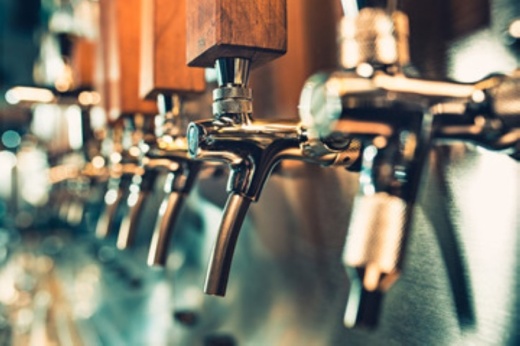In the wake of these limitations, local business owners in Sugar Land and Missouri City are struggling.
Nathan Rees, owner of Texas Leaguer Brewing Co. in Missouri City, said the second closure of bars has been even more challenging than the first.
“We had that nice little spark in June where everything opened back up, and now July’s been even worse than the spring because even though restaurants are opened back up there, not as many people are going to them, and bars are not picking up any beer at all,” Rees said. “So it’s just a different climate right now, for sure.”
Local business owners adapt
Although Texas Leaguer Brewing Co. offers an open-concept facility, the establishment was required to close again in late June because more than 51% of its sales are from alcohol, Rees said. It was not until the Texas Alcoholic Beverage Commission issued the option for temporary license modifications for breweries in mid-July that Rees had the option to reopen the brewery’s patio area.
“It’s one of the safest places you can go and sit and enjoy a beer,” Rees said.
However, July 22 the TABC released clarified guidance that breweries whose alcohol sales comprise 51% or more of sales still may not allow customers to consume alcohol on the premises.
Rees said July 23 he is still seeking clarity on the reversal. The brewery has lost 80% of its normal revenue during the pandemic, he said.
Irfan Motiwala, co-owner of Alings Chinese Cuisine in Sugar Land, said his restaurant has had to adapt and learn new ways of doing business.
“We had to invest in [personal protective equipment] for the staff and guests,” Motiwala said. “We had to build plexiglass dividers for safe pickup. We seat tables 6 feet apart and use disposable menus and packaged condiments. Since our business is 80% takeout, we had to restructure our kitchen and create new positions to better serve our takeout, curbside and delivery guests.”
At the beginning of the pandemic, Motiwala said Alings lost 70% of its business. However, as of mid-July business was down 25%, he said. Despite the loss of business and COVID-19 hardships, Alings continues to offer complimentary meals to medical professionals and first responders and has provided over 7,000 meals as of mid-July, Motiwala said.
“Under the circumstances, we are blessed to do well enough to stay open and retain our staff,” Motiwala said. “We are open at 50% dine-in [capacity], and our patio is open for outdoor dining.”
Rees said he had to furlough his taproom employees at Texas Leaguer Brewing Co. Outside-sales staff members were still furloughed as of July 22, he said.
“The hardest part has been our taproom staff, which they’re all hourly workers that really operate off tips, and there’s just no way to employ them without a taproom,” he said.
Although unemployment insurance claims in Sugar Land and Missouri City ZIP codes have decreased from 10,658 from March 25-April 25, all five ZIP codes are still seeing thousands of claims as of early July with 3,898 claims made from June 10-July 11, according to Texas Workforce Commission data.
Despite the closures, Rees said the brewery has been offering beer to go during the pandemic and adjusting production accordingly.
“We’ve had to-go this entire time, which we’re grateful for,” he said. “I can’t imagine, you know, this time last year that law wasn’t in effect. So I’m glad that’s been something that happened within the year that has helped us during this time.”
Pandemic economic effects
Local sales tax revenue in Sugar Land has also taken a hit in the wake of stay-at-home orders and reduced capacity at businesses. In response, the city of Sugar Land launched its Sweet Cash program in June to stimulate the economy.
Motiwala, who registered Alings as a participating business in the Sweet Cash program, said it has been helpful as his restaurant tries to recover.
“Sweet Cash has been doing well for us. ... We got quite a few guests coming in to purchase gift cards to participate in the program,” he said.
Through the program, when customers purchase gift cards of at least $40 at any local business in Sugar Land, they have the opportunity to submit proof of this purchase online. In return, the customer receives a gift card worth 50% of their purchase to a participating business, and a front-line worker or organization receives a gift card worth the other half.
As Sugar Land is in its budget planning season, Assistant City Manager Jennifer May said during a July 21 City Council meeting that financial accomplishments from the previous year as well as resiliency efforts prepared the city for emergencies such as COVID-19, but Sugar Land is not immune.
“When you look at just sales tax alone, we are projecting a more than $4 million decline when you look at the fiscal year [2020-21] projections versus what we actually collected in fiscal year [2019-20],” May said.
From January to July 2019, Sugar Land received $31.5 million in sales tax revenue. As of this July, Sugar Land has received $29.2 million in sales tax revenue in 2020—a roughly 7% decrease year over year, according to the Texas comptroller of public accounts website.
As a local business owner who contributes to Sugar Land’s local economy, Motiwala said he looks forward to the end of the pandemic.
“We do miss seeing the restaurant filled with lots of people, the noise, the celebrations and, most of all, socializing with our guests,” Motiwala said. “When this is over I am gonna hug everyone I see.”





